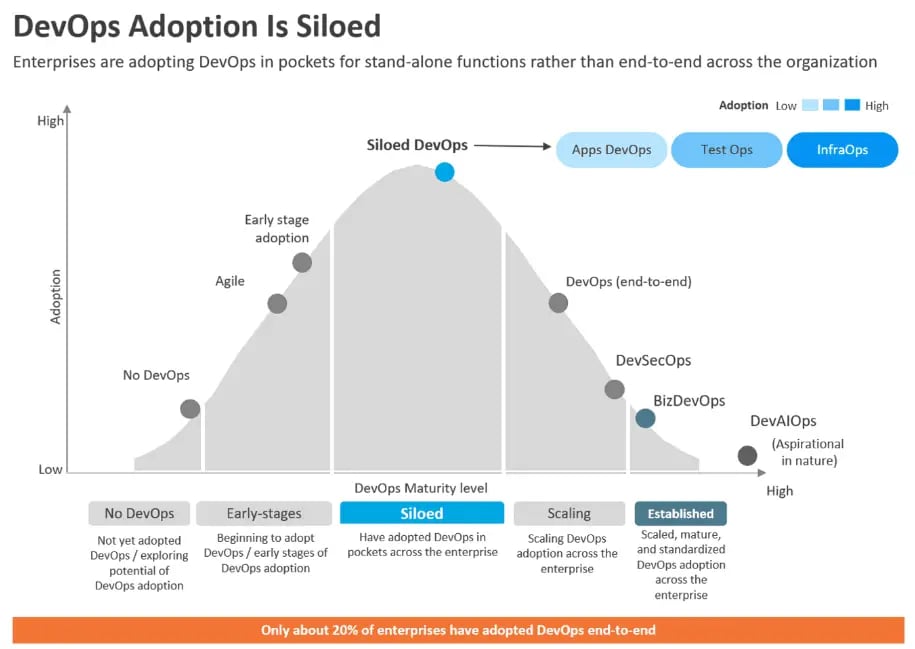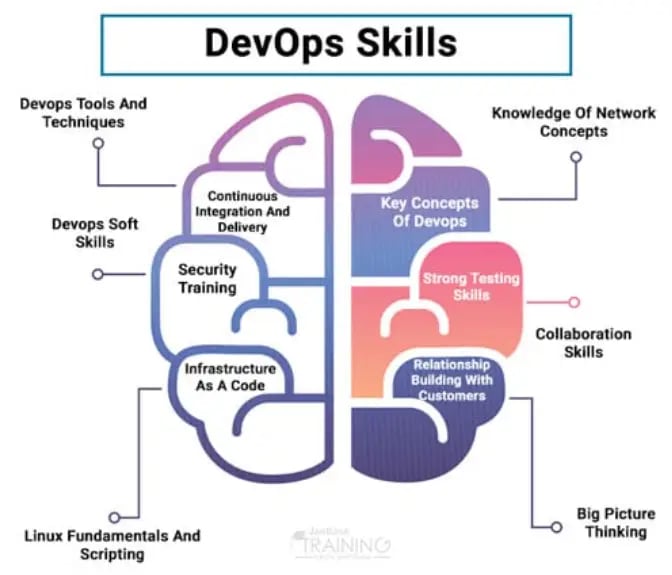Recently DevOps mythology has gained massive popularity amongst many companies, mainly because of its ability to push higher quality software, faster delivery times, and ultimately, safer systems.
Implementing DevOps as a stand-alone technique is challenging. As a result, as substantiated in the image below, enterprises are increasingly developing DevOps adoption approaches that align with business goals.

(source)
In fact, a recent study conducted by Global Market Insights reveals that the industry's future shows encouraging numbers. In 2019 the size of the DevOps market exceeded $4 billion and was projected to grow at a CAGR of over 20% between 2020 and 2026.
However, hiring DevOps engineers can be a daunting task. It requires recruiters to be aware of all the ideal platforms for sourcing talented candidates, technical and non-technical skills, and more.
In this article, we have outlined some DevOps hiring best practices that you can utilize to hire skilled DevOps engineers.
So, let's dive deep!
Best Practices for selecting the right DevOps Candidates
1. Hire based on the specific need
Outlining the specific need of the position is the first and foremost approach you can take to select the right DevOps candidates.
If you are planning to build a DevOps team from scratch, you need to identify the structure followed within your organization. Pinpoint the areas which need immediate need. It will enable you to identify what gaps you are required to fulfill and what to expect from the candidate while hiring.
But, if you currently have a DevOps team and are searching for a specific person, you are likely well aware of the fact that most DevOps professionals bring a variety of abilities to the table. That's where you can easily identify if you are looking for design, implementation, security, testing, deployment, management, or some combination of knowledge.
2. Develop a clear job description
You get a highly specialized group of professionals when you design your DevOps team from the bottom up. It is, therefore, advisable to provide thorough job descriptions that include the skills and expertise needed for the position.
While creating the DevOps job description, clearly mention the following:
- Expectations for the role and what the DevOps Engineer will be responsible for.
- Technical skills, experience, and qualifications necessary to be successful in the role.
- List the specific tasks, duties, and responsibilities that the DevOps Engineer will have.
- Describe the tools the DevOps Engineer will need to be familiar with and use.
- Explain the communication requirements of the role and how the DevOps Engineer will interact with other teams.
- Describe how the DevOps Engineer will collaborate with other teams in the organization.
- Explain how the DevOps Engineer will report their progress and results.
- Provide any other information that is relevant to the role.
|
Accelerate Your DevOps Hiring! With iMocha, create tailored skills assessments to identify top talent efficiently. Cut your hiring time in half and ensure a perfect fit for your niche DevOps roles. |
3. Build Employment database
Another DevOps hiring best practice is building an employee pipeline. It helps you get in touch with talented DevOps candidates. Since the DevOps field is in high demand, finding a high-skill DevOps Engineer immediately is challenging.
Thus, many of the best candidates are currently employed and may never see your job advertising unless you reach out to them directly.
So, how can you reach out to them?
Well, utilize a combination of online and offline networking to potential source candidates. LinkedIn and Monster, Indeed, network groups, and other similar locations can be great places to start.
Another method is to leverage referral programs. People in similar professions often network with one another, and employee referrals can be an excellent way to gather new candidates.
4. Take help with sourcing tools
The DevOps hiring process is undoubtedly challenging. As it can be tough to find the ideal DevOps candidates, there are many sourcing tools available in the market to help you streamline the recruitment process.
These tools enable you to find and recruit the best candidates by searching for candidates on various job boards and social media platforms.
It also tracks and monitors the progress of applications, creates job postings, shares job postings across multiple channels, and more. Here is a list of 12 sourcing tools you can utilize to make your DevOps recruiting journey more seamless.
5. Don't settle with local talent
Technology has enabled people to work and manage their work from any location. Moreover, many employees are seeking for flexible work culture due to the increasing adaptation of work from home and hybrid work culture.
Thus, you can hire local talent or consider people from other locations while conducting DevOps recruiting. Many skilled DevOps engineers around the world are seeking job opportunities. And the chances of filing for a job position using flexible work culture are much ease.
Best Practices for Assessing DevOps Engineer Skills
(source)
6. Assess the technical abilities of candidates
DevOps engineers have specific skills and abilities they need to train; if they aren't what you're looking for, you will be disappointed in who you find. Thus, assessing technical skills is one of the DevOps hiring best practices.
But what technical skills to look for when hiring a DevOps engineer?
- Knowledge of tools like Docker, Amazon, Bamboo, Puppet, Jenkins, and Kubernetes.
- Understanding Linux/Unix fundamentals and programming languages like Python, Ruby, and Perl.
- Knowledge of IT security
- Strong knowledge of the most recent methods and technologies for delivering applications, such as Amazon, Azure, and Google Compute Engine (GCE).
- Automate the release management process by coordinating software releases.
- Incorporating agile development approaches into the company's best practices for creating new products and improving current ones.
|
Failing to draw talented IT project managers because of lengthy hiring process? Learn how iMocha can help you reduce candidate screening time by 85%. |
7. Prioritize soft skills
No matter what their technical abilities are, individuals won't succeed if they lack the appropriate soft skills for the job.
The following are the soft skills that are most important in a DevOps environment:
- A capable team player who knows how to teach the other engineers in the team new information and abilities.
- The ability to share information accurately is crucial for every DevOps engineer.
- Effectively test software updates before implementing them, which requires minimal supervision.
- Ability to do critical planning.
- When it comes to organizing infrastructure changes, this ability is very crucial.
8. Identify potential knowledge gaps
Here are some of the underlying fundamentals to cover in your interview process: how servers work and boot (even if you're running containers, they're still running on a server somewhere), networking technologies (TCP/IP fundamentals, routing, IP addressing), encryption, basics of how databases work, and data stores.
You can also conduct take-home assessments and identify the project-handling capabilities of candidates in real time. It enables you to provide more detailed information about their knowledge and expertise.
|
Dealing with unconscious bias while screening candidates? Use iMocha's AI-powered digital skills assessments for data-driven hiring. |
9. Ask relevant questions
The only way to identify the true knowledge of DevOps engineers is by asking relevant questions related to their field. Below are some questions you can use to evaluate candidates' knowledge in various domains within DevOps.
- What do you know about setting up and managing cloud infrastructure?
- How have you implemented automation and scripting to streamline and improve operational processes?
- Describe your experience with using configuration management tools.
- What experience do you have with container orchestration and management?
- How have you monitored and optimized application performance?
- What experience do you have with version control systems?
- Describe a time you had to troubleshoot a complex issue in production and how you went about it.
- How do you keep up with the latest technology and trends in DevOps?
- What strategies do you use to ensure security and compliance in a DevOps environment?
For an easy way to evaluate a candidate's proficiency in DevOps skills, consider leveraging our specialized DevOps assessments.
Best Onboarding Practices for HR for DevOps Candidates
10. Offer clear communication standards
Create clear communication standards with the DevOps team, as well as with other teams inside the organization. This will guarantee that everyone participates fully in the onboarding process.
11. Invest in training
Invest in the DevOps candidate's learning and development.
The individual can benefit from training to become familiar with the DevOps team's tools and procedures and to join the team more quickly and productively.
The following are a few potential learning and training options for the DevOps candidate:
- DevOps online certification courses offered online
- Training programs with knowledgeable DevOps engineers
- Seminars and conferences for professionals
- Online courses and tutorials
- Mentoring initiatives
- Interactive workshops
- Technical instruction and departmental collaboration
- Training in cloud computing
12. Maintain the onboarding checklist
Make a list of the activities the DevOps candidates should take to be prepared for the position as part of an onboarding checklist.
Setting up accounts and access, understanding the tools and procedures, and completing any required documentation should all be on this checklist.
Want to know how iMocha can help with DevOps recruiting?
iMocha is a skill intelligence platform that helps recruiters make data-driven hiring decisions. It enables recruiters to assess the technical as well as non-technical skills of candidates. Using the skill assessment feature, you can easily customize the assessment based on the role requirement within the company.
This assessment also enables you to determine the proficiency of candidates using medium, easy, and hard questions. Recruiters can choose from a database of more than 100,000 questions or ask for custom ones to be developed.
This tool creates a thorough test report analysis following the completion of the tests so you can clearly understand how the applicant performed in each section and make informed decisions.
For DevOps engineers, iMocha provides various assessments to assess the concepts such as Apache, C#, salesforce, and data structures.
- Using this tool, you can eliminate the risk of employing the wrong candidate, ultimately leading to a more productive and successful team.
- The platform also offers an integrated coding environment that simulates a real-world coding environment.
- Its AI-based proctoring technology ensures that the assessments are conducted fairly and securely.
- AI-Logic Box, a pseudo coding platform, helps assess DevOps developer skills in C#, Salesforce, Apache, JFrog, etc.
- Using iMocha's live coding interview, they can remotely assess candidates' logical and problem-solving skills and pick the best tableau developer for their organization.
|
Tired of the slow and painful hiring process? Automate your hiring with iMocha's AI-powered digital skills assessments. |
Conclusion
Overall, phrasing it out again. DevOps recruiting is a challenging task. However, by utilizing the DevOps hiring best practices, you can be ensured that you are going to find the most skilled fit candidate for the job.
Remember to evaluate candidates thoroughly and consider both technical and soft skills when making your hiring decisions. Using skills assessment platforms like iMocha, you can increase your chances of finding a skilled engineer who meets your organization's requirements.
FAQs
What questions should I ask a DevOps engineer?
In order to assess the technical skills of candidates, you can ask the following set of questions:
- How will you approach a project that needs to implement DevOps?
- What is the difference between continuous delivery and continuous deployment?
- Explain the term "Infrastructure as Code" (IaC) as it relates to configuration management.
- What is configuration management?
- Explain the different phases in DevOps methodology.
Can you hire a DevOps engineer as a freelancer?
Yes, you can hire a DevOps engineer freelancer to fulfill the role. However, DevOps developers, programmers, and software engineers charge on an hourly, part-time, or full-time contract basis. Moreover, the charges may also differ geographically.
What is the difference between a DevOps engineer and a DevOps consultant?
DevOps engineers are primarily responsible for building and creating structure within already defined DevOps processes. In contrast, DevOps consultants are reliable for providing guidelines to teams and imparting knowledge about better-resolving issues.
|
Wondering how to identify critical skills for organizational growth? Talk to our experts to learn how we enable Capgemini, Cognizant, TCS, Fujitsu and other global organizations to do so! |

